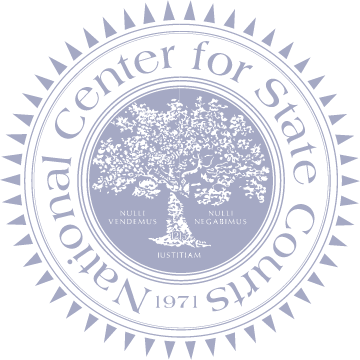Indiana judges, clerks and their staffs don’t need to read statistical reports to know that thousands of cases are flowing through their courts and that the number is constantly increasing. They intuitively know from their daily work and the many litigants that come through their courts’ doors that state courts dispense justice in the United States. But if they wanted to verify this hunch, where is a good source to have it quantified? A good place to start is the web site of the National Center for State Courts (NCSC or “the Center”).
The Center collects and analyzes data relating to the work of our nation’s state courts though the Court Statistics Project. And an interactive website through the NCSC provides users with tools for comparing and analyzing court data from all the state court systems.
But this is only one of hundreds of topics on which the NCSC provides resources to state courts. A quick look at the list of topics on the Center’s web site (www.ncsc.org) shows a myriad of relevant issues affecting state courts. Among the court topics are materials on Administrative Dispute Resolution, Budget Management, Court Reporting, Drug Courts, Electronic Filing, Ethics and Discipline, Evidence Storage and Handling, Human Resource Management, Identity Thefts, Jury Management, Mental Health Courts, Public Access to Court Records, Technology Planning and Acquisition, Video Technology, Workload and Resource Assessment, and many, many more.
 So what is the NCSC? It is an independent, nonprofit court improvement organization founded at the urging of former Chief Justice of the US Supreme Court, Warren E. Burger. He envisioned the NCSC as a clearinghouse for research information and comparative data to support improvement in judicial administration in the state courts. The Center’s main office is in Williamsburg, VA, with smaller offices in Washington, D.C., Arlington, VA, and Denver, CO.
So what is the NCSC? It is an independent, nonprofit court improvement organization founded at the urging of former Chief Justice of the US Supreme Court, Warren E. Burger. He envisioned the NCSC as a clearinghouse for research information and comparative data to support improvement in judicial administration in the state courts. The Center’s main office is in Williamsburg, VA, with smaller offices in Washington, D.C., Arlington, VA, and Denver, CO.
The “shareholders” of the NCSC are the Conference of Chief Justices (CCJ) and Conference of State Court Administrators (COSCA). The Chief Justice who serves as the president of CCJ is also the Chair of the NCSC Board of Directors and the court administrator who serves as the President of COSCA serves as the Vice Chair of the NCSC Board of Directors. The Center also provides association services to several other court related groups such as the American Judges Association (AJA), the National Association for Court Management (NACM), Council of Chief Judges of State Courts of Appeals (CCJSCA), Court Information Technology Officers Consortium (CITOC), the Conference of Court Public Information Officers (CCPIO) and others.
Similar to the National Conference of State Legislators and National Governors Association, the Center is funded, in part, by annual dues paid by the state courts. Charitable contributions and revenues generated through the Center’s consulting arm provide additional sources of funding for its operations. The Institute for Court Management is part of the NCSC, adding an educational curriculum especially designed for court managers.
The Center also has an international division which offers an array of research, consulting, education and information services to strengthen the rule of law in countries around the world. The Center’s consulting arm provides expert services to many courts needing assistance on a wide range of administrative, technological, organizational and other issues.
A Government Affairs office based in Washington DC maintains a close eye on federal legislation affecting state courts and particularly the availability of grant funding for state courts. The Center has been a vocal advocate for the state courts and their inclusion in grant programs that have traditionally been channeled though the states’ executive branches.
Several Indiana courts have availed themselves of the Center’s expert consultant services. The Supreme Court and Court of Appeals have sought the Center’s advice on evaluating the technology needs of the appellate courts; Center staff assisted the Supreme Court in recruiting and hiring an IT director for Appellate Technology; the Center also conducted a study for the Lake County Courts, and more recently the Center is conducting an evaluation for Clark County.
An invaluable resource is the Center’s library which holds over 36,000 items relating to court issues. The Library loans resources and provides photocopy services directly to members of the court community.
The Center’s Technology Division is instrumental in court technology efforts such as the Court Technology Conference which is organized every two years, the development of national standards for court information, and vendor lists that help court managers find appropriate vendors for their technology needs.
Some recent Center projects included a public opinion poll, which is a first ever nationwide survey measuring public perception on how the three branches of government work together on public policy issues that affect the administration of justice; a survey on court e-filing adoption and practices; work by the NCSC’s Center for Sentencing Initiative which contributed to a report from the Pew Charitable Trust showing that one in 31 US adults are behind bars, on parole or on probation; and the Third National Judicial Leadership Summit for the Protection of Children, which took place in Austin, Texas in 2009.
Indiana’s judges, clerks and their staffs will find the resources available through the National Center for State Courts extensive, timely and useful.